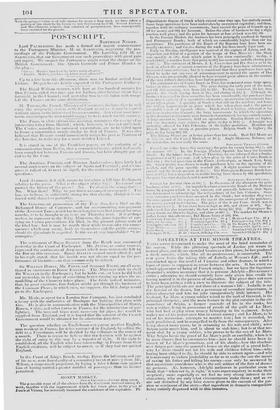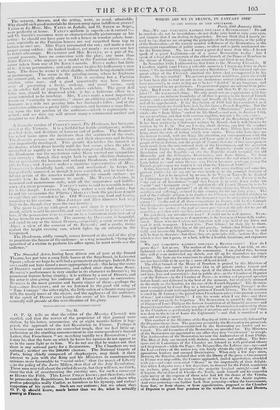NOVELTIES AT THE MINOR THEATRES.
V.vres seems determined to make the most of the brief remainder of his t•eaI•011. While the glittering spectacle of Lurline yet wears Its newest gloss, end draws crowded houses as a first piece, he has produced at fresh uovelty, which, like all its predecessors, is successful. The new pieve bears the taking title of Isoliclle, or Woman's Life ; and is vonstructed upon the model of I 7elorine and other dramas, I ii which a lapse of years is supposed to (recur between the acts. It has every ex- ternal aill,earallet' of being of French origin : but we have the ingenious drainiatist's written assurance that it is genuine Adelphi—BuexsTose's entire ; otherwise we should certainly have only given him credit for having marred it in the process of adaptation. The piece does not seem to have been written with a view to illustrate the subject of the title. The principal incidents are not those of a woman's life : Isabelle is not the heroine of the drama, but a personage of secondary importance, in whese character and fate we take comparatively little interest. Her husband, Le Marc, a young soldier raised to the rank of General, is the principal character; and the main feature in the plot consists in the cir- cultist:owe of Sripio, a former comrade of his in the ranks, but new a robber, being in possession of proofs of the guilt of Le Marc, who had lost :It play some nuin.sy belonging to his regiment. Scipio makes use vf his power over him to extort money; and Le Mare, to be rid of his tormentor. attempts to murder him ; but is wounded, his guilt proclaimed, and Inc compelled to fly from the consequences. After being stbseat many years, he is returning to his wife and child; when Scipio again meets hint, amid is about to stab him ; but-is-at that-mo- ment shot by a young soldier, who proves to be the sou of Le Mara. Scipio keeps tlw proof of Le Mare's guilt so carefully, when it is by mere cluince that he encounters him—how he should have been ig:t noramt of Le Mare's promotion, and of his abode—how the charbon- flier Scipio gets into the general's house on the night of a grand ball— why Le Mare should not let his wife and children follow him—why, having been obliged to fly, he should he able to return again—and why it is necessary to violate probability so far as to make the son the means of saving his father and killiug his enemy—can only be answered by unit mysterious providence who is the sole arbiter of the fate of draw lie persona. As, however, Adelphi audiences in particular- seem to think that " whatever is, is right," it were supererogatory to make them sceptical ; more especially ats we feel no very strong interest in the diameters, who are only what circumstances make them ; and as we are not disturbed by any false course given to the cutrent, of the pas- sion or sentiment of the story—that ingredient in drautatie composition being entirely dispensed with iu this instance. The scenery, dresses, and the acting, were, as usual, admirable. Why should such good materials be thrown away upon indifferent pieces? YATES as Le Marc, Mrs. YATES as Isabelle, and 0. SMITH as Scapa., were perfectly at home. YATES'S uniform is superb—is it correct ?— and 0. Satan's costumes were as characteristically picturesque as his acting : he should not have gone to rob a house in wooden sabots, how- ever, especially as the Parisian houses are not carpetted from top to bottom as ours are. Miss DAL' personated the son ; and made a most proper young soldier she looked modest, yet manly : we never saw her to better advantage. HUCKSTONE and Mrs. KEELEY, as a pair of Sa- voyard peasants, have no connexion with the plot ; any more than JOHN HEINE, who appears as a model to the Parisian artists—a chit- raeter taken from one of DE KOCK'S novels. R owl: makes but little of it : it is tio personation ; and only serves to give his buffoonery a new turn. The thess he wears is ultra shabby, without being characteristic or picturesque. The scene in the painting-room, where he frightens the servant-girl, is merely absurd. This is anything but a Parisian attelier, entre nons ; and a good opportunity AIDS here thrown away of presenting a lively, striking, and novel scene, sneh as an (atelier full of young French artists exhibits. The great doll baby, too, should be dispensed with : it has a ludicrous effect in a scene intended to be touching. Mrs. Yams reads a most impressive lesson on " curiosity in servants ; " shows an edifying. example of for- bearance in a wife not peeping into her husband's b,lluis; and at the conclusion addresses a pretty little sermonet, mid bestows a stage Mess- ier; upon the fair portion of the audience—which is rapturously re- ceived ; and we dare say will attract many a sentimental mother and daughter to see Isabelle.



















 Previous page
Previous page